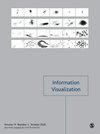具身互动有益吗?导航网络可视化研究
IF 1.8
4区 计算机科学
Q3 COMPUTER SCIENCE, SOFTWARE ENGINEERING
引用次数: 2
摘要
网络可视化通常用于分析各种环境中的关系,如社会、生物和地理交互。为了有效地探索网络可视化,用户需要快速导航到网络的不同部分并分析本地细节。显示和交互技术的最新进展激发了改进可视化和交互设计的新愿景。过去对网络设计的研究已经确定了在3D和2D中可视化网络的一些关键好处。然而,很少有人研究不同层次的具体互动对网络分析的影响。我们提出了一项受控用户研究,该研究比较了四种网络可视化环境,其特征是条件和硬件利用了不同数量的实施例和视觉感知,从带有标准鼠标的2D可视化桌面环境到3D可视化虚拟现实环境。我们测量了20名参与者在完成三项网络分析任务时的准确性、速度、感知工作量和偏好,每项任务都需要独特的导航和大量的努力才能完成。对于需要参与者迭代整个可视化而不是专注于特定区域的任务,我们发现参与者使用VR HMD和轨迹球鼠标比传统的桌面设置更准确。从工作量的角度来看,在我们的三项任务中,虚拟现实通常被认为是对精神要求最低、最不令人沮丧的。它也是首选的,并被列为最有效和最具视觉吸引力的条件。然而,使用VR来比较两个并排的网络是困难的,并且在三个任务中的两个任务中,它与其他条件相似或慢。总体而言,在特定任务中具有更大体现性的条件的准确性和工作负载优势表明,有希望创造更有效的环境来分析网络可视化。本文章由计算机程序翻译,如有差异,请以英文原文为准。
Is embodied interaction beneficial? A study on navigating network visualizations
Network visualizations are commonly used to analyze relationships in various contexts, such as social, biological, and geographical interactions. To efficiently explore a network visualization, the user needs to quickly navigate to different parts of the network and analyze local details. Recent advancements in display and interaction technologies inspire new visions for improved visualization and interaction design. Past research into network design has identified some key benefits to visualizing networks in 3D versus 2D. However, little work has been done to study the impact of varying levels of embodied interaction on network analysis. We present a controlled user study that compared four network visualization environments featuring conditions and hardware that leveraged different amounts of embodiment and visual perception ranging from a 2D visualization desktop environment with a standard mouse to a 3D visualization virtual reality environment. We measured the accuracy, speed, perceived workload, and preferences of 20 participants as they completed three network analytic tasks, each of which required unique navigation and substantial effort to complete. For the task that required participants to iterate over the entire visualization rather than focus on a specific area, we found that participants were more accurate using a VR HMD and a trackball mouse than conventional desktop settings. From a workload perspective, VR was generally considered the least mentally demanding and least frustrating to use in two of our three tasks. It was also preferred and ranked as the most effective and visually appealing condition overall. However, using VR to compare two side-by-side networks was difficult, and it was similar to or slower than other conditions in two of the three tasks. Overall, the accuracy and workload advantages of conditions with greater embodiment in specific tasks suggest promising opportunities to create more effective environments in which to analyze network visualizations.
求助全文
通过发布文献求助,成功后即可免费获取论文全文。
去求助
来源期刊

Information Visualization
COMPUTER SCIENCE, SOFTWARE ENGINEERING-
CiteScore
5.40
自引率
0.00%
发文量
16
审稿时长
>12 weeks
期刊介绍:
Information Visualization is essential reading for researchers and practitioners of information visualization and is of interest to computer scientists and data analysts working on related specialisms. This journal is an international, peer-reviewed journal publishing articles on fundamental research and applications of information visualization. The journal acts as a dedicated forum for the theories, methodologies, techniques and evaluations of information visualization and its applications.
The journal is a core vehicle for developing a generic research agenda for the field by identifying and developing the unique and significant aspects of information visualization. Emphasis is placed on interdisciplinary material and on the close connection between theory and practice.
This journal is a member of the Committee on Publication Ethics (COPE).
 求助内容:
求助内容: 应助结果提醒方式:
应助结果提醒方式:


